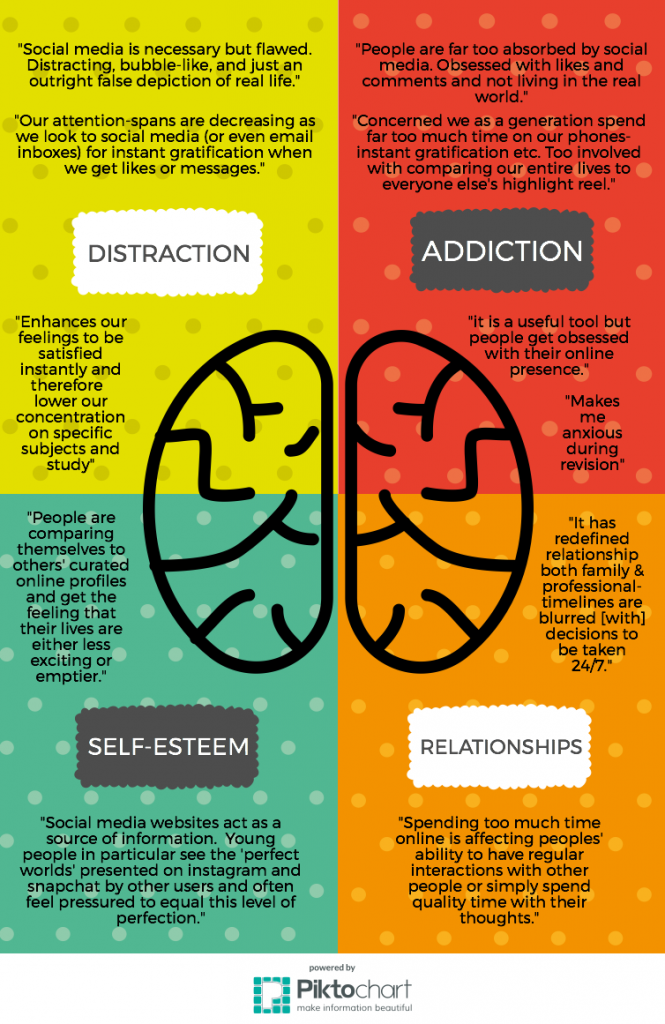This blog post is one of a series on phase two of LSE 2020, a student-focused project that has engaged with 440 students in 2017. It is written by Emma Wilson, Graduate Intern for LTI. You can find her on Twitter (@MindfulEm).
In this post, we discuss an issue that was frequently brought up by students: the impact of technology on society and our emotional wellbeing in an era of ever-increasing interconnectivity. The issues raised provide context into how today’s students navigate the digital age. This will, undoubtedly, have an impact on student expectations about the teaching and learning experience. It also highlights some of the challenges that need to be addressed if we are to support the mental health and wellbeing of our students.
Digital capability includes self-care, and that self-care requires a critical awareness of how digital technologies act on us and sometimes against us. (Beetham, 2016)
Students raised concerns about the impact of technology on our mental wellbeing and our ability to form and maintain relationships. They spoke about digital identity, and how our online activity influences a person’s place in society.
Concern for student mental health has been of increasing importance in recent years. A 2016 YouGov survey of Britain’s students found that 27% reported having a mental health problem, with 63% feeling they had levels of stress significant enough to interfere with daily life. There is the fear that technology (especially social networking and the need for instant gratification) may impact an adolescent’s neurobiology and exacerbate symptoms of stress, anxiety and social isolation. [1][2]
In both the face-to-face interviews and the online survey carried out for LSE 2020, students frequently raised concerns about the impact that technology can have in other areas of life. These concerns have been represented in an infographic and divided into four areas:
- Addiction to our devices and social media
- Distraction and instant gratification
- The distortion of reality and sense of self, and its impact on our self-esteem
- The social impact and the changing nature of our relationships

Firstly, students have raised concerns about the impact of technology on our attention spans. With the temptation of constant distraction – from Facebook to checking our phones – this poses the risk that traditional ways of teaching and learning might prove more challenging for today’s student. Given these concerns, it may be more appropriate to use diverse methods to cater for learning preferences. For example, changing the format of a two-hour lecture by interspersing it with interactive elements such as group exercises, short videos or encouraging audience participation.
It is also important to consider the mental health impact from social media and online communication. Whilst students spoke of a world that is becoming more integrated, they were also aware about the distorted reality of a person’s online persona. Despite this self-awareness, it was felt that students were struggling to manage the amount of time spent online.
This highlights the importance of continuing to fund and run wellbeing weeks and self-management course for students, such as those previously conducted by Student Wellbeing Services or the Student Union. The mental wellbeing of students will undoubtedly impact performance and overall satisfaction of the LSE experience.
Finally, students raised concerns about the impact that virtual communication might have upon our face-to-face communication skills.
‘…some people are substituting online interaction for real life meetings’
‘Generally social media has had a detrimental effect on our social lives by increasing social anxiety and limiting real human contact’
Such concerns emphasise the importance of including face-to-face interaction and interactivity during lectures, seminars and group projects. It may also partly explain why students frequently commented on the value they ascribe to discussion and debate within their course. Whilst the online world has become an integral part of the student journey, students are concerned about its social implications and do not want to see the total replacement of human interaction at university.
Moving forward, there is a growing importance for equipping students with the tools needed to manage their wellbeing in the 21st century. This could be facilitated through a whole-university approach between teachers, staff, Student Unions and student wellbeing services.
The mental wellbeing of students will undoubtedly impact performance and overall satisfaction of the LSE experience. We need to work together to ensure that tomorrow’s student is well-equipped for the rigour of higher education.
References
[1] ANDERSON, J. & RAINIE, L. 2012. Millennials will benefit and suffer due to their hyperconnected lives. Pew Internet and American Life Project.
[2] GIEDD, J. N. 2012. The Digital Revolution and Adolescent Brain Evolution. Journal of Adolescent Health, 51, 101-105.







[…] The student voice on technology, wellbeing and society […]